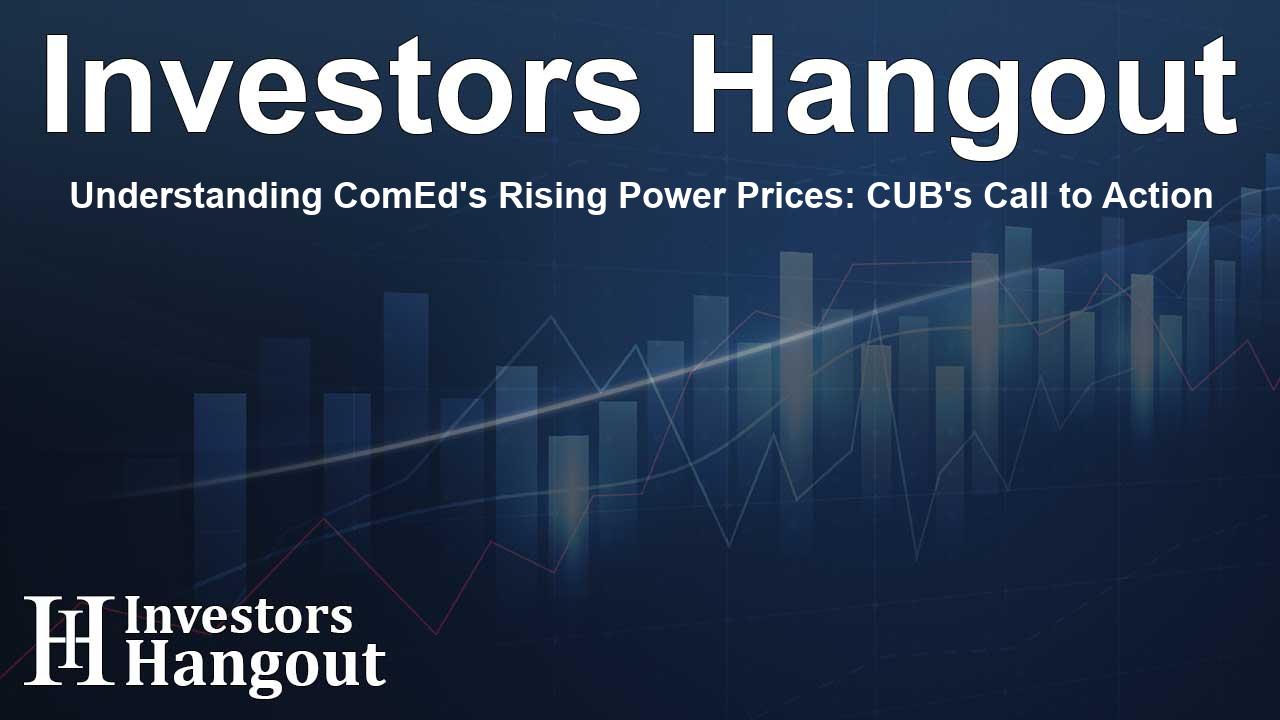Understanding ComEd's Rising Power Prices: CUB's Call to Action

Understanding the Challenges of Rising Power Prices
As many customers of Commonwealth Edison (ComEd) face a significant surge in electricity costs—up to 45 percent—it is crucial for utility providers to engage actively with their customers during this challenging period. The Citizens Utility Board (CUB) has highlighted the importance of cooperating with customers, especially those with difficulties maintaining their electricity usage during the summer months. This initiative is not just vital for financial reasons but also for ensuring the safety and well-being of consumers.
CUB's Appeal for Action
In light of the imminent summer heat, CUB's Executive Director, Sarah Moskowitz, has made an urgent call to ComEd to provide additional support to its customers. She emphasizes the need for consumer-friendly payment options, allowing customers more flexibility in managing their bills. This support is essential for many who may struggle financially to keep their homes cool and safe during peak temperatures.
Understanding ComEd's Pricing Structure
The recent increase brings the summer "price to compare" to approximately 10.028 cents per kilowatt-hour (kWh) from June to September. It’s imperative for customers to understand that while ComEd passes supply costs to them without any markup, the rate increase reflects the rising cost of electricity distribution and generation which affects overall prices on their bills.
Financial Impact on Consumers
On average, ComEd estimates that the price increase could lead to additional expenses of about $10.60 per month for customers, amounting to an increase between 10% and 15%. This hike is attributed to various factors, including increased costs associated with reserve power, also referred to as capacity. CUB has pointed out that these rising capacity costs stem largely from ongoing policy challenges faced by the power grid operator in Northern Illinois.
Strategies for Managing Higher Energy Costs
CUB has provided several recommendations for consumers aiming to cope with the elevated power prices during these summer months:
- Enhance Energy Efficiency: Implement simple measures like weatherizing windows and doors, and ensuring unnecessary lights are turned off to reduce energy consumption. It’s crucial to prioritize safety and comfort while also minimizing waste.
- Stay in Contact with ComEd: It’s advisable for consumers who may struggle financially to reach out to ComEd to explore available payment plans and energy efficiency initiatives that could alleviate some of the burden.
- Evaluate Available Assistance Programs: ComEd’s Peak Time Savings program allows customers to gain bill credits by reducing usage during periods of high demand. There is also a community solar initiative that provides the advantages of solar energy without requiring customers to install panels.
- Avoid Exploitation by Alternative Suppliers: Since 2015, Illinois consumers have lost significant amounts due to alternative electricity suppliers. Given the current market, ComEd often remains the most reliable choice. However, if a community has arranged a deal with a supplier, it’s important to verify the pricing and terms.
Legislative Support through CEJA
While rising prices pose challenges for consumers, the Climate and Equitable Jobs Act (CEJA) offers some relief by mandating a line item on ComEd bills referred to as the Carbon Free Energy Resource Adjustment (CFERA). This adjustment subsidizes energy generated from nuclear power in Illinois and may occasionally provide credits to customers when energy prices exceed certain thresholds. This dynamic could enhance affordability for customers over the upcoming year.
CUB, serving the interests of utility consumers for over 40 years, has been at the forefront of advocating for fair energy practices. Established through Illinois legislation, CUB works tirelessly to secure significant savings for residents and small businesses by contesting unjust rate increases and ensuring consumer rights are protected.
For assistance, customers can contact CUB's Consumer Hotline or visit their website for more detailed information. Together with ComEd, proactive measures can be taken to navigate this challenging season successfully, keeping residents safe, comfortable, and connected.
Frequently Asked Questions
What is the cause of the recent power price increase?
The recent increase in power prices is primarily due to the rising costs associated with reserve power and capacity pricing changes affecting utilities like ComEd.
How can consumers manage their electricity bills during the summer?
Consumers can implement energy-saving measures, reach out to ComEd for payment options, and explore assistance programs aimed at reducing their electricity costs.
Is there any legislative support for energy consumers?
Yes, the Climate and Equitable Jobs Act (CEJA) offers subsidization for certain energy types and may provide credits to customers based on energy pricing structures.
Why should customers contact ComEd?
Customers experiencing difficulties should connect with ComEd to discuss payment plans and learn about programs designed to help mitigate high energy costs during peak demand periods.
What resources does CUB offer for consumers?
CUB provides various resources, including a hotline, website, and tips for managing energy bills and getting assistance with costs and energy efficiency.
About The Author
Contact Dylan Bailey privately here. Or send an email with ATTN: Dylan Bailey as the subject to contact@investorshangout.com.
About Investors Hangout
Investors Hangout is a leading online stock forum for financial discussion and learning, offering a wide range of free tools and resources. It draws in traders of all levels, who exchange market knowledge, investigate trading tactics, and keep an eye on industry developments in real time. Featuring financial articles, stock message boards, quotes, charts, company profiles, and live news updates. Through cooperative learning and a wealth of informational resources, it helps users from novices creating their first portfolios to experts honing their techniques. Join Investors Hangout today: https://investorshangout.com/
The content of this article is based on factual, publicly available information and does not represent legal, financial, or investment advice. Investors Hangout does not offer financial advice, and the author is not a licensed financial advisor. Consult a qualified advisor before making any financial or investment decisions based on this article. This article should not be considered advice to purchase, sell, or hold any securities or other investments. If any of the material provided here is inaccurate, please contact us for corrections.
